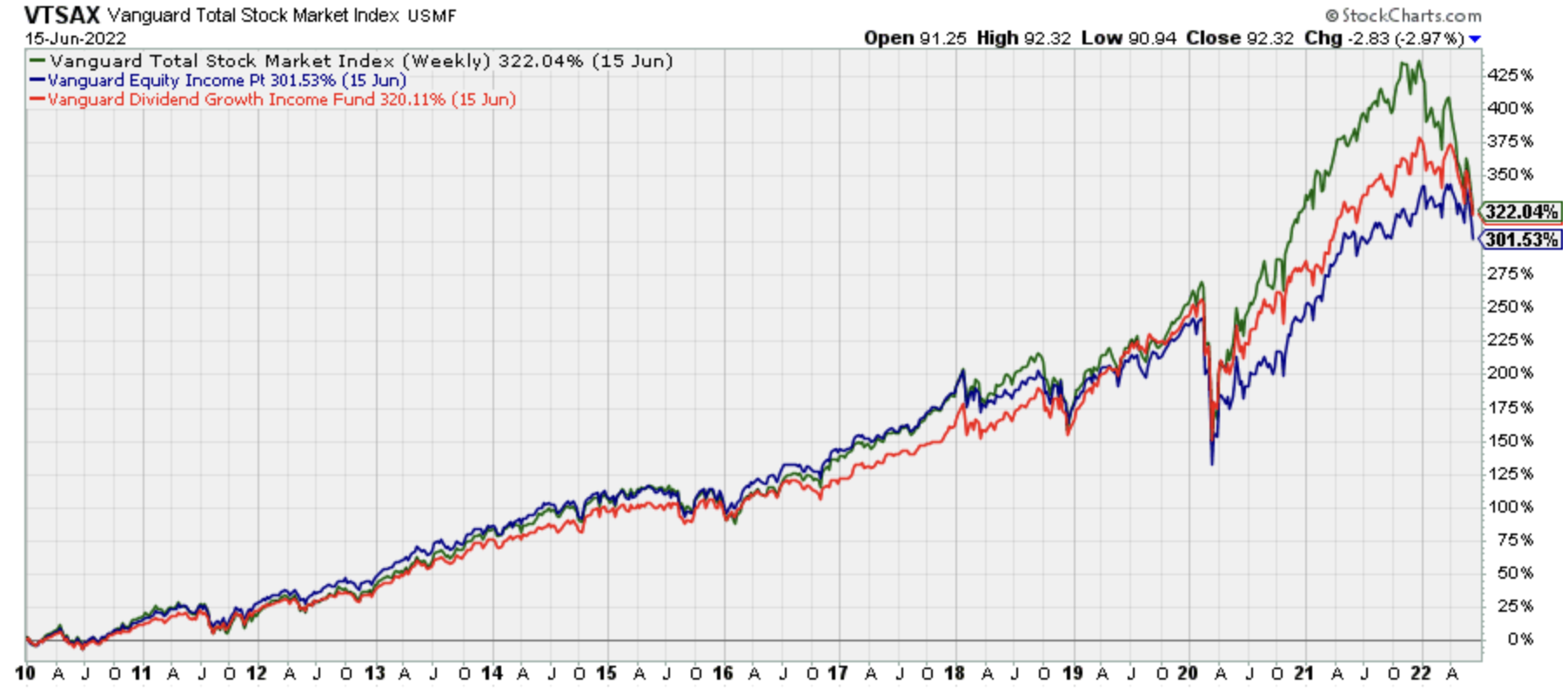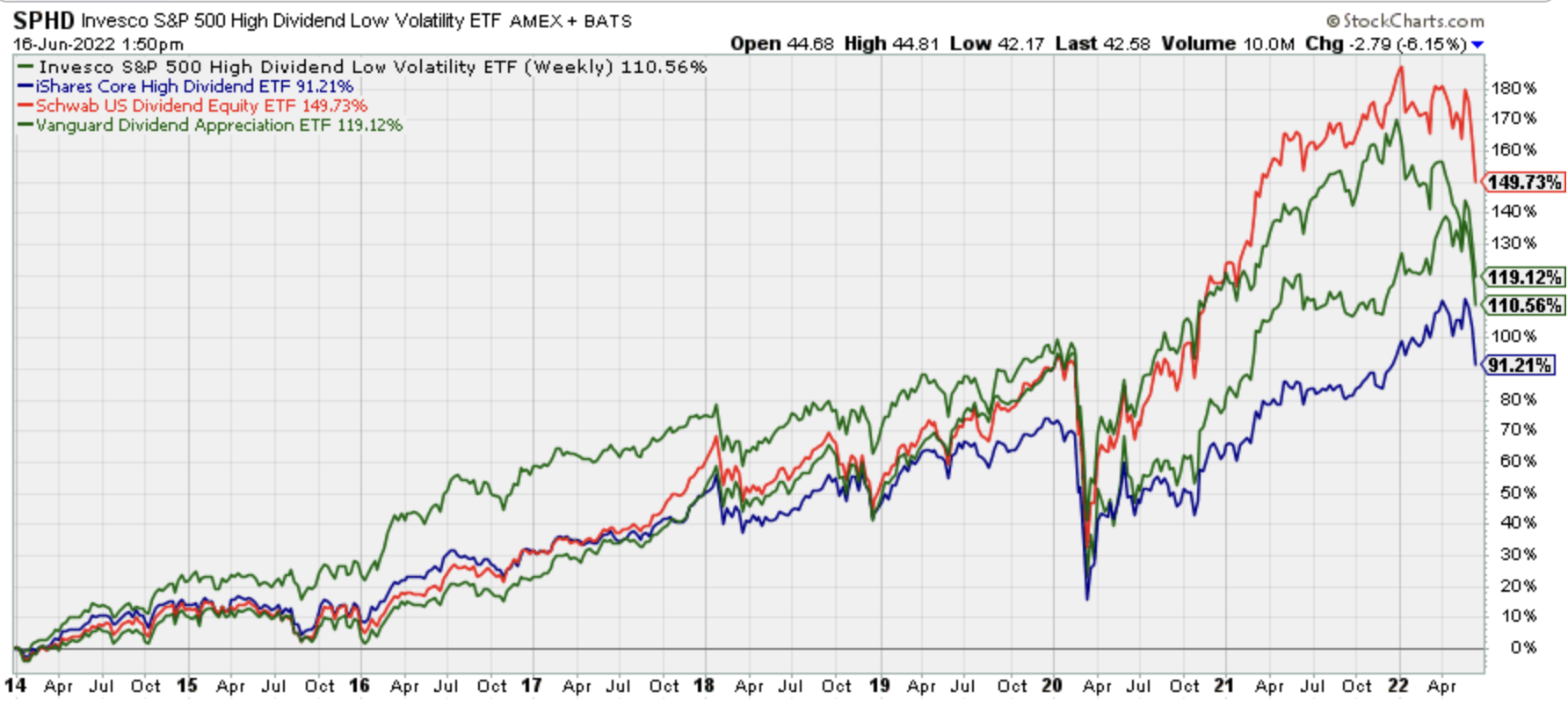Index Investing vs Dividend Investing
- June 16, 2022
- by Michael

In this post we’ll consider two types of investing strategies. Dividend investing and index investing. While they are both part of a long term investment strategy there are some important differences.
Dividend investing is buying stocks (or funds) with high dividends. For example if a stock pays a 3% dividend, each year you’d get 3% times the amount you hold in the form of a cash dividend. Yeah - free money! Well not quite free since there is some risk involved in owning the stock (in case it crashes). That said, generally companies with high dividends are stable, well established, and have a large “moat” around them which keeps competition at bay. So compared to some high flying tech stock, a dividend stock is relatively safe. Still it is a stock and not as safe as something like a bond, a CD, or cash in the bank.
Index investing is all about buying funds (ETFs or mutual funds) that track a particular index (total market, global, sector funds, etc). With an index fund your return should be fairly close to the market. Some advantages of index investing are lower fees (no active management to pay for) and reduced risk due to wide diversification. Generally with index funds any dividends are a side effect so they do not generate much income. However there is more room for growth in the form of appreciation vs the established dividend stocks. To make matters more confusing there are even indexes that track dividends, so you can buy a dividend index fund. For our purposes when we mention dividend fund in this post, we’ll drop the ‘index’ part unless it is part of the fund’s actual name.
The big question - which strategy works better?
Going forward nobody knows what will happen with stock returns. All we can do is look into the past and see if dividend funds did better than index funds.
Here is a graph that compares the Vanguard Total Stock Market Index Fund to the Vanguard Dividend Growth Fund (VDIGX) and Vanguard Equity Income Fund (VEIPX):
Note the returns are fairly similar, except the Total Stock Market fund (green) has a more wild swing starting in late 2020.
Also consider that not all dividend funds provide the same returns. Here is a sample of the performance since 2014 of a few income ETFs listed at the end of this post:
It is surprising just how different the returns can be over 10 years between ETFs that do similar things. Goes to show that there are no guarantees with investing and luck does pay a role.
Here is a complete breakdown of the practical differences as they apply to an individual investor:
Index Investing's Biggest Advantages:
Index funds are designed with a hands off approach for individual investors. Advantages include:
- Simplicity - you are buying “the market” which is easy to understand
- Less time for research - pick your fund category and let it ride
- Diversification - your money is spread across many stocks. It depends on the index though, some have thousands of holdings, others much less.
- Low fees - since index funds are not actively managed there is less work to be done, and they pass the savings on to you.
Who Is Index Investing Right For?
Index funds are great for people who either do not like to spend too much time researching the market, or those who want a “set it and forget it” approach to long term investing.
Index funds are not for people who want a quick profit. With index funds it takes patience to make a big profit (think decades not weeks).
With index funds you also need to consider your overall asset allocation as you would likely hold more than one fund (unless it is a life path or target date fund).
Advantages of Dividend Investing:
There are several benefits to investing in dividends:
- Get paid to wait - dividends provide a steady return while waiting for capital growth.
- Increasing dividend growth - if you reinvest your dividends in more shares that means exponential growth (your dividends get bigger and bigger over time).
- Preservation of capital - quality companies that pay dividends are more mature and stable than average companies. These stocks tend to hold up much better when the market drops compared to speculative stocks.
- Create an income stream - most stocks pay an annual or quarterly dividend. Checking your brokerage account and finding cash is a nice feeling.
- Protection against inflation - stocks generally keep up with inflation long term. That said, the price of a fund (let alone an individual stock) will fluctuate a lot. Dividend stocks provide the opportunity to receive income and maintain purchasing power.
- Favorable tax treatment - if you are using a tax protected account (IRA, 401k, Roth) your dividends are tax free!
Who Is Dividend Investing Right For?
If you want to go after dividends the simplest option would be to buy a mutual fund or ETF that focuses on dividends. Here are some examples:
- Vanguard Dividend Growth Fund
- Vanguard Dividend Appreciation Index Fund
- Vanguard High Dividend Yield Index
- Vanguard Equity Income Fund
- Fidelity Dividend Growth Fund
- T. Rowe Price Dividend Growth Fund
- Invesco S&P 500 High Dividend Low Volatility ETF
- iShares Core High Dividend ETF
- Schwab US Dividend Equity ETF
- Vanguard Dividend Appreciation Index ETF
If you are a savvy investor you could research high dividend stocks and construct your own portfolio. With this approach you are on your own in terms of managing your holdings, making sure you are adequately diversified, etc. This can eat up a lot of time and energy. This approach does avoid paying a fund’s expense ratio, but could also incur transaction fees.
Having a dividend fund as part of your overall asset allocation would be one way to hold large cap stocks with an income focused twist.









